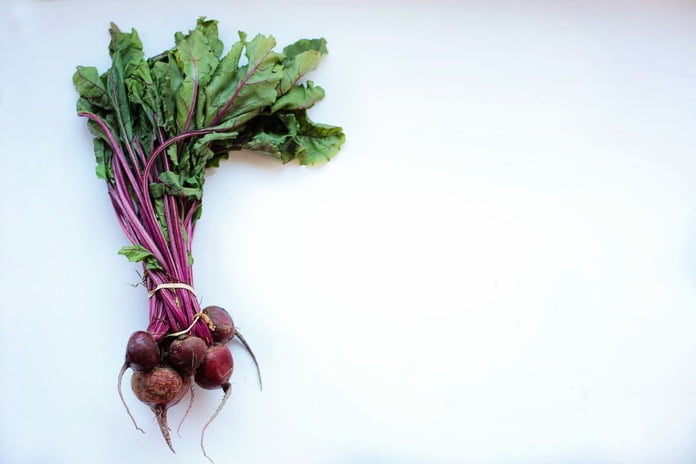A recent study evaluated the effect of daily dietary nitrate from beetroot juice on individuals with uncontrolled high blood pressure.
Over one billion people worldwide are affected by high blood pressure or hypertension.
However, despite advances in medicine, high blood pressure remains uncontrolled in over 50% of individuals being treated with medication.
Hence, there is a significant clinical need for a novel therapeutic to target primary and secondary interventions for high blood pressure.
Nitric oxide signalling as a target to control high blood pressure
A reduction in the bioavailability of nitric oxide, either by a decrease in production or increased consumption, has been linked to the development of elevated blood pressure.
Previous studies have shown a positive correlation between vascular function and nitric oxide levels and a decrease in the level of nitric oxide in individuals with high blood pressure compared to matched controls.
Therefore, nitric oxide signalling has become an attractive target mechanism in a bid to control high blood pressure.
Nitric oxide is a chemical compound that plays an important role in chemical signalling in the body. For example, it plays a key role in maintaining blood vessels and blood pressure regulation.
It is known as a vasodilator as it signals the surrounding smooth muscle to relax resulting in the relaxation of narrowed blood vessels and subsequently increased blood flow.
In the body, nitric oxide is synthesized through the consumption of dietary nitrate, which can be found in many foods such as spinach, beets, arugula and even dark chocolate or raw cacao.
Increasing the consumption of these foods will boost nitric oxide levels.
Dietary nitrate is an important contributor to nitric oxide signalling
As dietary nitrate appears to be an important contributor to nitric oxide signalling, many studies have investigated the potential mechanism and the role it plays in regulating blood pressure.
However, conflicting evidence has been reported, with some studies showing an inverse association between dietary nitrate and blood pressure regulation.
Many of these studies, however, included healthy, normal-weight males and there is a lack of research including individuals with uncontrolled high blood pressure.
A recent randomized, double-blind, placebo-controlled, cross-over trial conducted by researchers in the Republic of Ireland and the United Kingdom aimed to assess more intensively the effect of dietary nitrate compared with placebo in individuals presenting with or suspected to have uncontrolled high blood pressure.
Their results were recently published in the British Journal of Nutrition.
The study included 20 individuals with an average age of 65 years and a body mass index (BMI) of 30.7 kg/m2.
The participants were suspected or known to have uncontrolled high blood pressure, excluding individuals with controlled high blood pressure and those with diabetes, cognitive impairment, kidney disease, or sleep apnea.
All of the participants were prescribed at least one anti-hypertensive medication.
The subjects were assessed over a period of seven days and invited to wear a blood pressure monitor for 24 hours on the first day and provide blood samples.
They were then randomly assigned to either a seven-day nitrate-rich beetroot juice, followed by a seven-day nitrate-depleted beetroot juice (placebo) or vice versa.
The researchers assessed the blood pressure and blood analysis before and after both seven-day juice treatments.
Beetroot juice increased blood nitrite levels and decreased blood pressure
The average baseline blood pressure was reported as 137 over 80 (optimal blood pressure is less than 120 over less than 80 and elevated blood pressure is classed as between 120-129 over less than 80).
The results showed dietary nitrate provided by the beetroot juice was well tolerated and a significant increase in plasma nitrite levels was observed.
Compared with the placebo, the nitrate-rich beetroot juice induced a reduction in 24-hour systolic and diastolic blood pressure.
These results suggest dietary nitrate has anti-hypertensive effects on treated individuals with uncontrolled high blood pressure. This supports existing evidence that dietary nitrate plays an important role in blood pressure regulation and has the potential for helping to reduce high blood pressure.
Hence dietary strategies targeting the nitric oxide signalling mechanism indeed appear to be promising potential treatments for individuals suffering from high blood pressure.
This trial was limited by the short duration and small sample size, hence future research into the long-term effect of dietary nitrate on blood pressure and in larger, more diverse populations is required.
Written by Lacey Hizartzidis, PhD
Relevant topics that may be of interest to you:
- Is poor oral health linked to worse blood pressure control?
- Nitrate-rich Vegetables and the Lowering of Blood Pressure Myth
- Can dementia be prevented with stricter blood pressure control?
- Ambulatory blood pressure monitoring may help prevent premature deaths
- Can a common blood pressure drug improve ovarian cancer treatment?
- Could blood pressure treatment be harmful to older seniors?
Reference: Kerley CP, Dolan E, James PE, Cormican L. Dietary nitrate lowers ambulatory blood pressure in treated, uncontrolled hypertension: a 7-d, double-blind, randomised, placebo-controlled, cross-over trial. Br J Nutr. 2018 Mar;119(6):658-663. doi: 10.1017/S0007114518000144.



